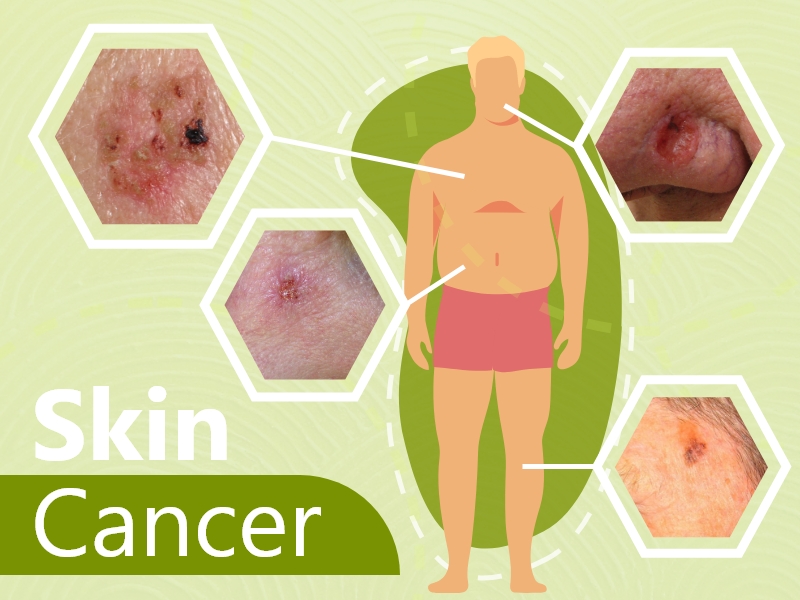Skin Cancer

Skin Cancer is an abnormal growth of skin cells that often develop on skin being exposed to the sun. This is a common type of cancer that also occurs on areas of skin that are not usually exposed to sunlight. There are three major types of skin cancer:
- Basal Cell Carcinoma
Basal Cell Carcinoma begins in the basal cells which is a type of cell within the skin that makes new skin cells as old ones die off. It frequently looks like a little transparent bump on the skin. Basal Cell Carcinoma often befalls on parts of the skin that are exposed to the sun such as the neck and head.
- Squamous Cell Carcinoma
Squamous Cell Carcinoma is a common type of skin cancer that progresses in the squamous cells that make up the middle and outer layers of the skin. It is not a life-threatening condition but can be aggressive. Squamous Cell Carcinoma can grow large or may spread to other areas of the body that can cause serious complications if left untreated.
- Melanoma
Melanoma is the most serious type of skin cancer that develops in the cells that makes melanin. This can form in your eyes and rarely in your body such as throat or nose. Melanoma usually affects people under 40 especially women.
What Causes Skin Cancer?
Skin Cancer begins in the top layer of the skin called the epidermis. It is a thin layer that provides a protective cover of skin cells that your body sheds continually. This type of cancer happens when alterations happen in the DNA of skin cells. The changes cause the cells to develop uncontrolled and form a mass of cancer cells.
Having lots of damage to DNA in skin cells results from UV radiation found in sunlight. Being exposed to the sun does not explain skin cancers that mature on skin not normally exposed to sunlight. This means that other factors might contribute to your risk of skin cancer such as having a condition that weakens your immune system or being exposed to toxic substances.
Signs and Symptoms of Skin Cancer
Basal Cell Carcinoma seems like a change in the skin such as a sore that won’t heal. These changes usually have one of the following characteristics:
- A blue, brown, or black lesion
- A pearly white, pink, or skin-colored bump that is translucent
- A waxy, scar-like lesion without a clearly defined border
- A flat, reddish patch with a raised edge is more common on the chest or back.
Squamous Cell Carcinoma signs and symptoms include:
- A new sore on an old scar
- A firm, red nodule
- A wart-like sore on or on your genitals or in the anus
- A red sore inside your mouth
The main Melanoma symptoms frequently are:
- The progress of an unusual-looking or a new pigmented growth on your skin
- A change in an existing mole
Melanoma does not always begin as a mole. It may also occur on otherwise normal-appearing skin.
Risk Factors of Having Skin Cancer
These are the lists of factors that may increase your risk of developing Skin Cancer:
- A history of sunburns
- A weakened immune system
- A personal history of skin cancer
- A family history of skin cancer
- Moles
- Fair skin
- Excessive sun exposure
- Precancerous skin lesions
- Sunny or high-altitude climates
- Exposure to arsenic
- Exposure to radiation
Safety Precautions
Most skin cancers are preventable. To protect yourself, here are some prevention tips:
- Wear protective clothing
- Wear sunscreen year-round
- Avoid the sun during the middle of the day
- Avoid tanning beds
- Be mindful of sun-sensitizing medicines. Some of these can make your skin more sensitive to sunlight.
- Check your skin regularly and report changes to your doctor.
Treating Skin Cancer
Skin cancer treatment depends on what type of skin cancer you are treating. Small skin cancer limited to the outward of the skin might not need treatment beyond a first skin biopsy that eliminates the full growth. If additional treatment is needed, options may include:
- Freezing early skin cancer with liquid nitrogen
- Curettage and cryotherapy or electrodesiccation
- Excisional surgery cuts out the cancerous tissue and a surrounding margin of healthy skin
- Chemotherapy
- Radiation therapy
- Biological therapy
- Photodynamic therapy
Medications for Skin Cancer
For Basal Cell Carcinoma:
- Imiquimod
- Vismodegib
- Fluorouracil Cream
- Sonidegib
For Squamous Cell Carcinoma:
- Pembrolizumab
- Cemiplimab-rwlc
For Melanoma:
- Ipilimumab
- Dacarbazine
- Dabrafenib
- Cobimetinib
- Aldesleukin
- Trametinib Dimethyl Sulfoxide
- Vemurafenib



